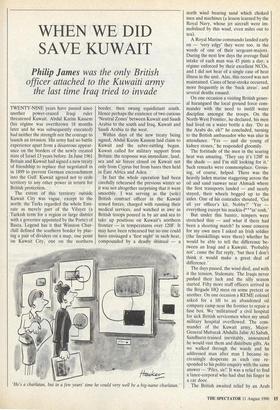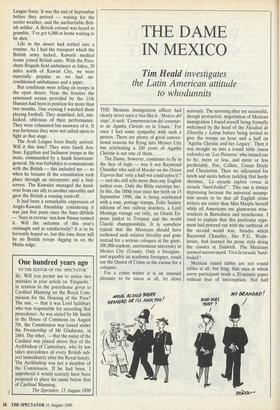WHEN WE DID SAVE KUWAIT
Philip James was the only British officer attached to the Kuwaiti army the last time Iraq tried to invade
TWENTY-NINE years have passed since another power-crazed Iraqi ruler threatened Kuwait. Abdul Karim Kassem (his regime was overthrown 18 months later and he was subsequently executed) had neither the strength nor the courage to launch an invasion. His army had no battle experience apart from a disastrous appear- ance on the borders of the newly created state of Israel 13 years before. In June 1961 Britain and Kuwait had signed a new treaty of friendship to replace that negotiated in in 1899 to prevent German encroachment into the Gulf. Kuwait agreed not to cede territory to any other power in return for British protection.
The extent of this territory outside Kuwait City was vague, except to the north: the Turks regarded the whole Emi- rate as merely part of the Vilayet (a Turkish term for a region or large district with a governor appointed by the Porte) of Basra. Legend has it that Winston Chur- chill defined the southern border by plac- ing a pair of dividers on a map, one point on Kuwait City, one on the northern border, then swung equidistant south. Hence perhaps the existence of two curious 'Neutral Zones' between Kuwait and Saudi Arabia to the south and Iraq, Kuwait and Saudi Arabia to the west.
Within days of the new treaty being signed, Abdul Karim Kassem laid claim to Kuwait and the sabre-rattling began. Kuwait called for military support from Britain: the response was immediate, land, sea and air forces closed on Kuwait not only from Cyprus but from bases then held in East Africa and Aden.
In fact the whole operation had been carefully rehearsed the previous winter so it was not altogether surprising that it went smoothly. I was serving as the (sole) British contract officer in the Kuwait armed forces, charged with running their medical services, and watched in awe as British troops poured in by air and sea to take up positions on Kuwait's northern frontier — in temperatures over 120F. It may have been rehearsed but no one could have envisaged a 'first night' in such heat, compounded by a deadly shimaal — a 'He's a charlatan, but in a few years' time he could very well be a big-name charlatan.' north wind bearing sand which choked men and machines (a lesson learned by the Royal Navy, whose jet aircraft were im- mobilised by this wind, even miles out to sea).
A Royal Marine commando landed early on — 'very edgy' they were too, in the words of one of their sergeant-majors. During the next few days the average fluid intake of each man was 45 pints a day; a regime enforced by their excellent NCOs, and I did not hear of a single case of heat illness in the unit. Alas, this record was not maintained. Cases of heat-stroke occurred, more frequently in the 'back areas', and several deaths ensued.
On one occasion a visiting British gener- al harangued the local ground force com- mander with the need to instill water discipline amongst the troops. On the North-West Frontier, he declared, his men had lived on a water bottle a day. 'Do as the Arabs do, eh?' he concluded, turning to the British ambassador who was also in attendance. 'Yes — and die young of kidney stones,' he responded gloomily.
The fortitude of the men in the searing heat was amazing. 'They say it's 128F in the shade — and I'm still looking for it.' Such remarks were commonplace. Grous- ing, of course, helped. There was the heavily laden marine staggering across the oil and sand runway near Ahmadi where the first transports landed — and nearly stayed, their wheels bogged up to the axles. One of his comrades shouted, 'Got all yer officer's kit, Nobby?"Yer everything except his mackin-f"""in'-tosh.'
But under this banter, tempers were stretched thin — and what if there had been a shooting match? In some concern for my own men I asked an Irish soldier (the Inniskillings were there) whether he would be able to tell the difference be- tween an Iraqi and a Kuwaiti. 'Probably not', came the flat reply, 'but then I don't think it would make a great deal of difference.'
The days passed, the wind died, and with it the tension. Stalemate. The Iraqis never pushed their luck and the silly season started. Fifty more staff officers arrived in the Brigade HQ mess on some pretext or another. On one occasion a REME colonel asked for a lift to an abandoned oil company camp near the frontier to repair a fuse box. We 'militarised' a civil hospital for sick British servicemen when my small military hospital overflowed. The com- mander of the Kuwait army, Major- General Mubarak Abdulla Jabir Al Sabah, Sandhurst-trained inevitably, announced he would visit them and distribute gifts. As we walked through the wards and he addressed man after man I became in-
creasingly desperate as each one re- sponded to his polite enquiry with the same answer — 'Piles, sir!' It was a relief to find a lance-corporal who had shut his finger in a car door.
The British awaited relief by an Arab League force. It was the end of September before they arrived — waiting for the cooler weather, said the uncharitable Brit- ish soldier. A British colonel was heard to grumble, 'I've got 6,000 at home waiting to be shot.'
Life in the desert had settled into a routine. As I had the transport which the British army lacked, Kuwaiti medical teams joined British units. With the Para- chute Brigade field ambulance at Jahra, 30 miles north of Kuwait City, we were especially popular as we had air- conditioned ambulances and a piper.
But conditions were telling on troops in the open desert. Near the frontier the armoured screen provided by the 11th Hussars had been in position for more than two months. One evening I watched them playing football. They stumbled, fell, mis- kicked, oblivious of their performance. They were exhausted but unaware of it. It was fortunate they were not called upon to fight at that stage.
The Arab League force finally arrived. Will it this time? They were Saudi Ara- bian, Egyptian and Sudanese troops in the main, commanded by a Saudi lieutenant- general. He was forbidden to communicate with the British — this included me — so when he became ill the consultation took place through an interpreter and a bed- screen. The Kuwaitis managed the hand- over from one ally to another smoothly and gave the British a rousing send-off.
It had been a remarkable expression of Anglo-Kuwaiti friendship considering it was just five years since the Suez debacle — 'Suez in reverse' was how Nasser termed it. Will the outcome of this year's onslaught end as satisfactorily? It is to be fervently hoped so, but this time there will be no British troops digging in on the Mutla ridge.











































 Previous page
Previous page